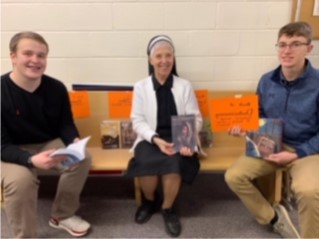Franciscan Sister Rochelle Kerkof develops a lesson plan around the question: What does one look for in the Bible? Truth? Religious Truth?
Designing a high school class for engaging CYO students on the nature and content of the Catholic Bible may be challenging. However, Sister Rochelle uses this devised method to help students understand that the Catholic Bible is a ‘collection’ of books, like the local public library in town.
As the class assembles, the first step is to use one’s personal I-phone to access the definition of ‘genre’: “Noun; a category of artistic composition, as in music or literature, characterized by similarities in form, style, or subject matter. Synonyms: category, class, classification, grouping, etc.”
After brief discussion, students are challenged to match an assortment of pre-selected library books with the various genres found in the Bible – given the name of a book in the Bible and its description on cards provided to them.
Students work in small groups, deciding which library book goes with which book of the Bible. They can disagree, challenge one another, work together, until there is a group consensus.
An example: The Book of Deuteronomy – (historical account of forming a nation-Israel) is matched with Steven Tanner’s Afghanistan (A political history from Alexander the Great to the Fall of the Taliban) or The Book of Proverbs – (anthology of wise sayings) is matched with R.J. Palacio’s 365 Days of Wonder.
This pre-staged activity helps students realize that all the books in the Bible are true; however, not all the books in the Bible are using the same genre in providing truth, especially religious truths. Students are encouraged not to take the Bible literally (black and white thinking), but “to search out the intentions of the sacred writers, attention should be given, among other things, to ‘literary forms.’ For truth is set forth and expressed differently in texts which are variously historical, prophetic, poetic, or other forms of discourse.” (Dei Verbum, Vatican II Document, Ch. 3, par. 12.)



